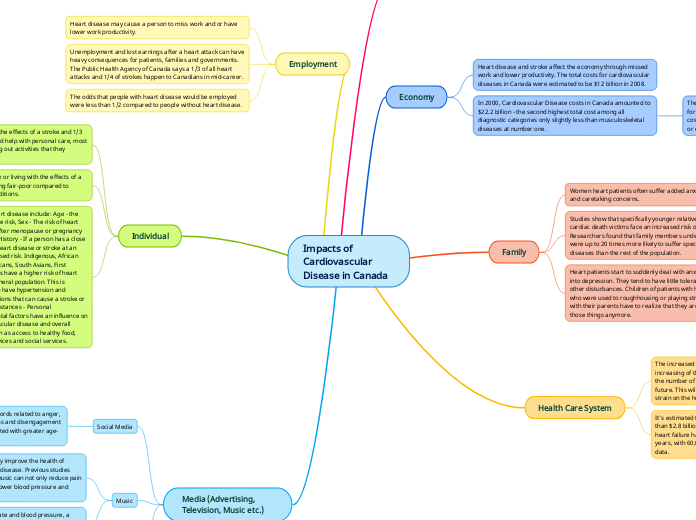Impacts of Cardiovascular Disease in Canada
Economy
Heart disease and stroke affect the economy through missed work and lower productivity. The total costs for cardiovascular diseases in Canada were estimated to be $12 billion in 2008.
In 2000, Cardiovascular Disease costs in Canada amounted to $22.2 billion - the second highest total cost among all diagnostic categories only slightly less than musculoskeletal diseases at number one.
The total costs for Cardiovascular Disease included $7.6 billion for health care costs (direct costs), and $14.6 billion for indirect costs resulting from lost economic productivity due to disability or death.
The costs include both direct costs: drugs, hospitals, physicians, and indirect costs: lost productivity associated with illness, injury, and premature mortality.
Family
Women heart patients often suffer added anxiety over familial and caretaking concerns.
Studies show that specifically younger relatives of sudden cardiac death victims face an increased risk of heart disease.
Researchers found that family members under the age of 35 were up to 20 times more likely to suffer specific heart diseases than the rest of the population.
Heart patients start to suddenly deal with anxiety and may slip into depression. They tend to have little tolerance for noise and other disturbances. Children of patients with heart disease who were used to roughhousing or playing strenuous sports with their parents have to realize that they are unable to do those things anymore.
Health Care System
The increased rate of obesity and of diabetes combined with increasing of the population is likely to lead to an increase in the number of people with Cardiovascular Diseases in the future. This will compromise the health of Canadians and put a strain on the health care system.
It's estimated that heart failure results in direct costs of more than $2.8 billion per year in Canada. Hospital visits caused by heart failure have gone up every year for the past several years, with 60,000 reported in 2013–2014 according to CIHI data.
Added Information
Subtopic
Employment
Heart disease may cause a person to miss work and or have lower work productivity.
Unemployment and lost earnings after a heart attack can have heavy consequences for patients, families and governments. The Public Health Agency of Canada says a 1/3 of all heart attacks and 1/4 of strokes happen to Canadians in mid-career.
The odds that people with heart disease would be employed were less than 1/2 compared to people without heart disease.
Individual
About 2/3 of people living with the effects of a stroke and 1/3 of those with heart disease need help with personal care, most report feeling limited in carrying out activities that they previously enjoyed.
Many people with heart disease or living with the effects of a stroke rated their health as being fair-poor compared to people without any chronic conditions.
Some of the risk factors for heart disease include: Age - the older someone is, the higher the risk, Sex - The risk of heart disease and stroke increases after menopause or pregnancy in women. Family and Medical History - If a person has a close relative who has experienced heart disease or stroke at an early age, they are at an increased risk. Indigenous, African and South Asian Heritage - Africans, South Asians, First Nations, Metis and Inuit peoples have a higher risk of heart disease and stroke than the general population. This is because they are more likely to have hypertension and diabetes, which are both conditions that can cause a stroke or heart disease. Personal Circumstances - Personal circumstances and environmental factors have an influence on the risk of developing cardiovascular disease and overall health. This includes things such as access to healthy food, safe drinking water, health services and social services.
Media (Advertising, Television, Music etc.)
Social Media
Researchers found that greater use of words related to anger, negative relationships, negative emotions and disengagement on social media was significantly correlated with greater age-related heart disease deaths.
Music
Research suggests that music may improve the health of patients who are living with heart disease. Previous studies have found that certain kinds of music can not only reduce pain and anxiety, but it may also help lower blood pressure and heart rate.
Because stress increases heart rate and blood pressure, a sympathetic response can put added strain on the heart. Listening to music may interrupt unrelieved anxiety associated with chest pain after a heart attack.
Television
Over the study period, there were 129 heart events and 205 deaths. Analysis showed that adults watching at least four hours of television a day had 49% greater risk of heart attack, stroke and death than those who watched fewer than two hours a day.
